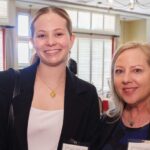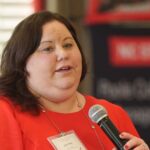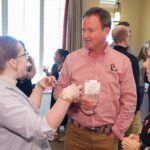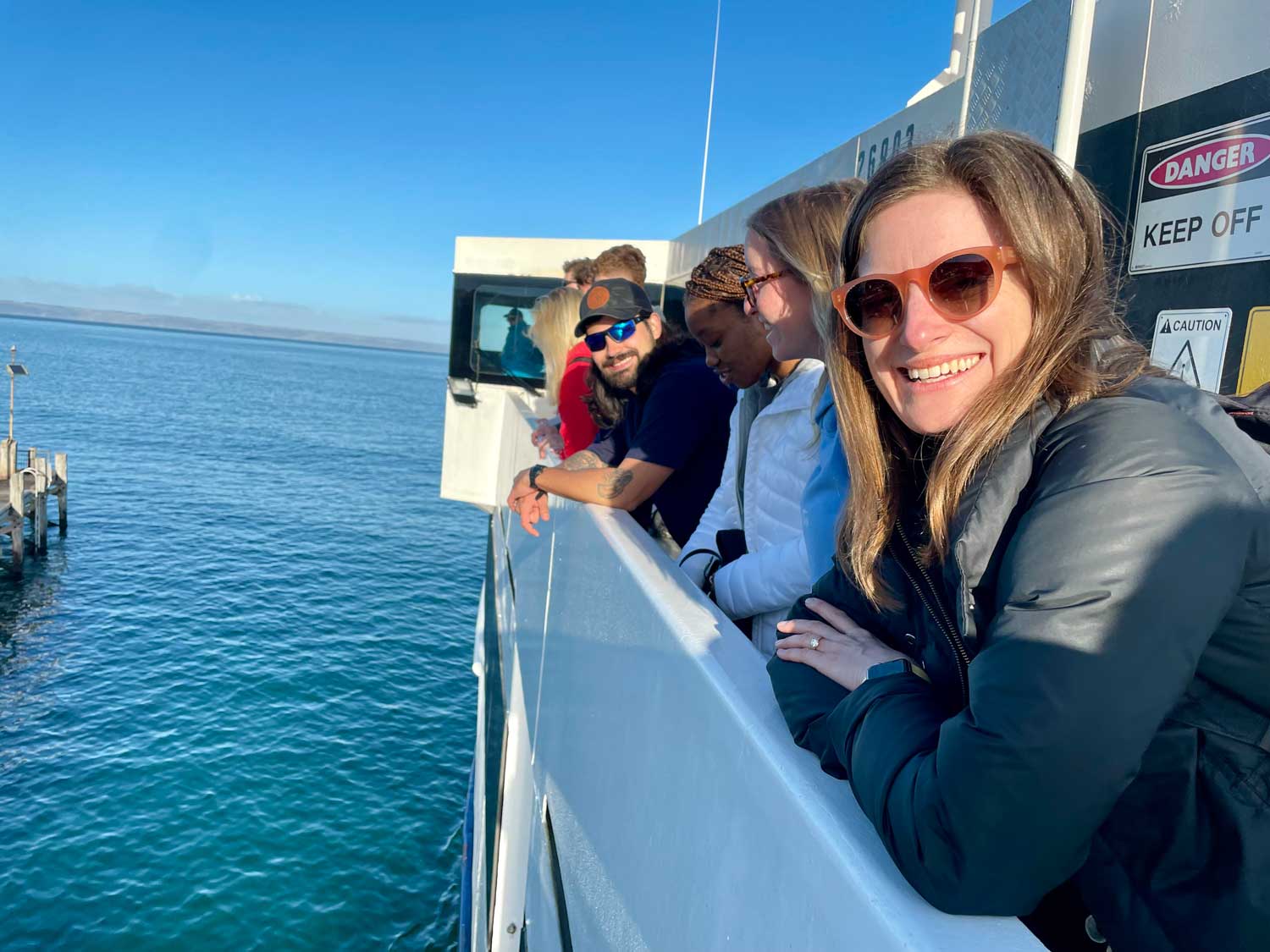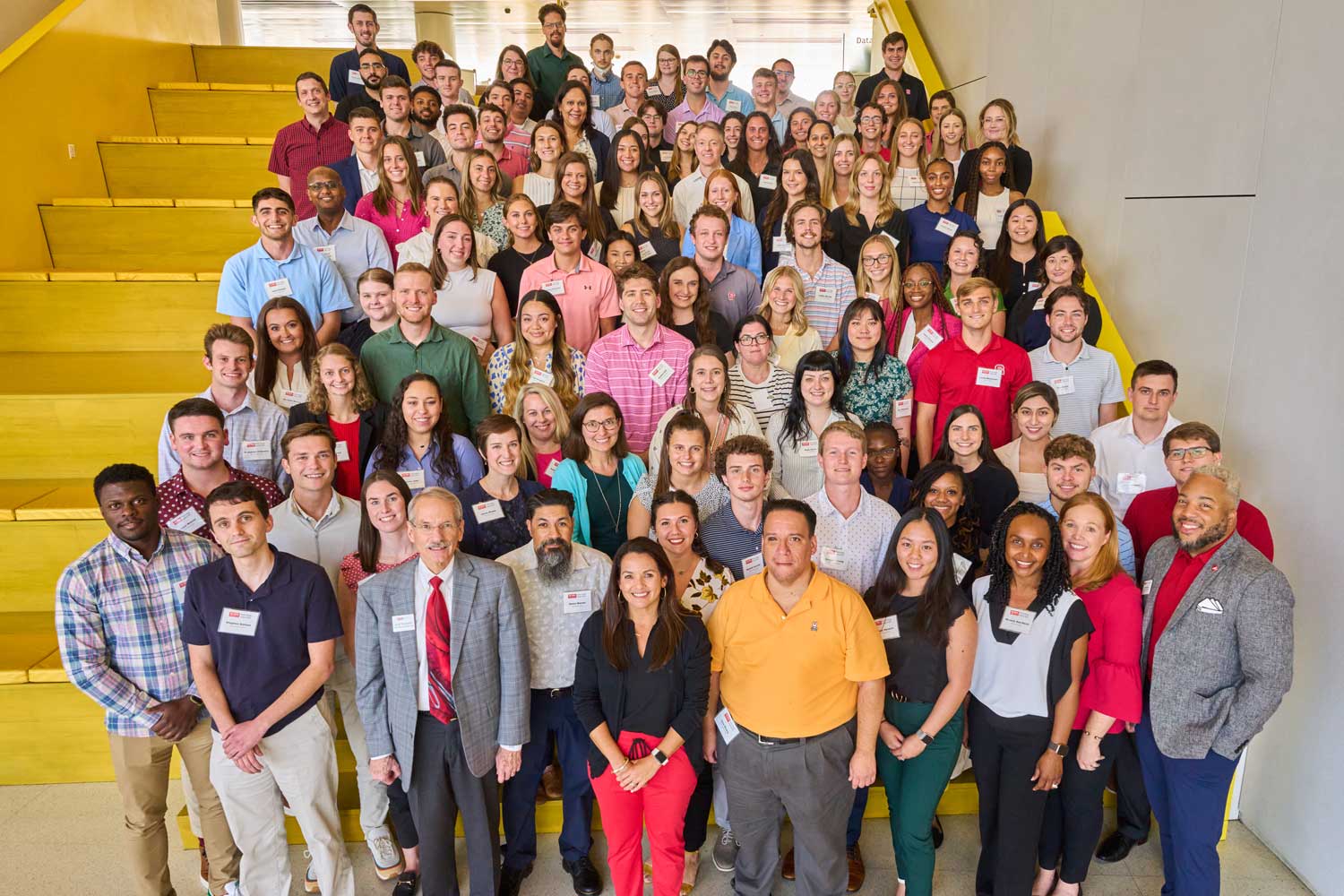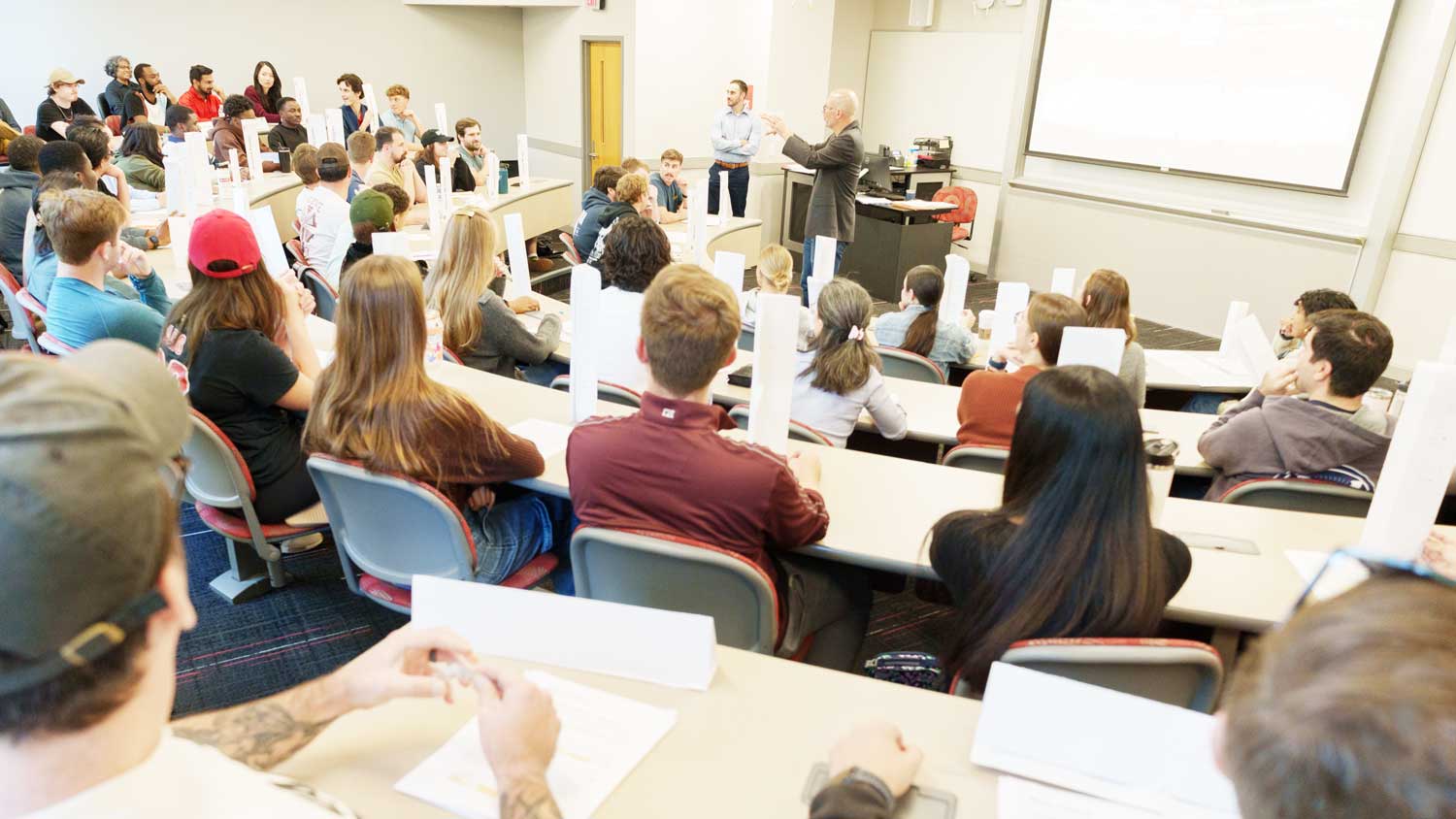Making a Path to the Corporate World
Poole College's mentorship programs aim to elevate student success as they start their careers.

Poole College senior Yvonne Mbugua initially considered an engineering major at NC State. But she changed her mind after learning of the broad opportunities that business offers.
“I wanted to have as many options as possible with one degree,” she says. “And I liked the thought of having a community at Poole that was really geared toward supporting students.”
That support has grown even stronger with the new Elevate Career Mentorship Program for Poole undergraduates. Students take a close look at their potential career interest by pairing for a year with a mentor who is a leader in the same field.
That deep dive has opened up a world of opportunities for Mbugua and other students accepted into the program through an application process.
“We’re offering high-impact mentorship relationships with C-suite executives that inspire students to explore a variety of career paths,” says Julie Cline, Poole assistant director of undergraduate career services. “Connecting students with established mentors is really helpful. They see what seasoned executives have done, and they realize that’s a possible journey for them.”
“Connecting students with established mentors is really helpful. They see what seasoned executives have done, and they realize that’s a possible journey for them.”
–Julie Cline
The program is a collaboration of the Poole College Advisory Board, the Poole College Student Advisory Board, Poole’s career services office, and the Department of Management, Innovation and Entrepreneurship. After a trial version last spring, the current expanded program includes 100 students and 50 mentors in a variety of industries.
Gaining a Head Start
When hiring recent college graduates for full-time jobs, some businesses prioritize students who interned with the company. So it’s important for students to apply for internships early. Poole’s mentorship program helps them keep their career track in focus.
“There’s significant evidence that shows the more mentoring you do, it cues students to the desired behaviors to turn their academic success into career success,” says Vikas Anand, Poole’s associate dean for academic programs. “They should be thinking about career management right from the day they start a Poole program.”
Students in the mentorship program gain a head start on networking and marketing their skills for a smoother transition from college to career.
“It’s about making students realize they belong in the corporate world,” Anand says, “and helping them find a path to get there.”
“It’s about making students realize they belong in the corporate world, and helping them find a path to get there.”
–Vikas Anand
Mbugua, one of 75 students in the program last year, got clarity about her path.
When the program began, “I was at a place where I wasn’t sure where I wanted my career to go. I felt like I wanted more exposure to the industry but wasn’t sure in what direction,” says Mbugua, who’s leaning toward a finance career.
She had had two valuable internships in investment banking and financial technology. “But I wanted to know what more was out there and didn’t know what to pivot to,” she says.
She also preferred a mentor who was a Poole graduate. Enter Ashu Vats, a 2008 finance and marketing graduate who mentored Mbugua and two other students last year.
“Having someone who’s been about 15 years in the industry I wanted to be in and getting his feedback on how to move forward…gave me more insight into how I could navigate that properly,” says Mbugua, who is pursuing a business concentration in information technology and a minor in accounting.
The Program Mechanics
The mentoring program provides a structured framework that helps mentors guide students in their career navigation. Mentors and mentees meet monthly to discuss specific themes, including career exploration through speed networking, business communications, career fair preparation and developing a personal brand.
An important component after each meeting is mentee assignments, such as conducting a practice interview and expanding a student’s network by connecting with a mentor’s business contacts. There’s also a Think, Do, Innovate project in which students work as consultants with their mentor to solve a business problem in the mentor’s industry.
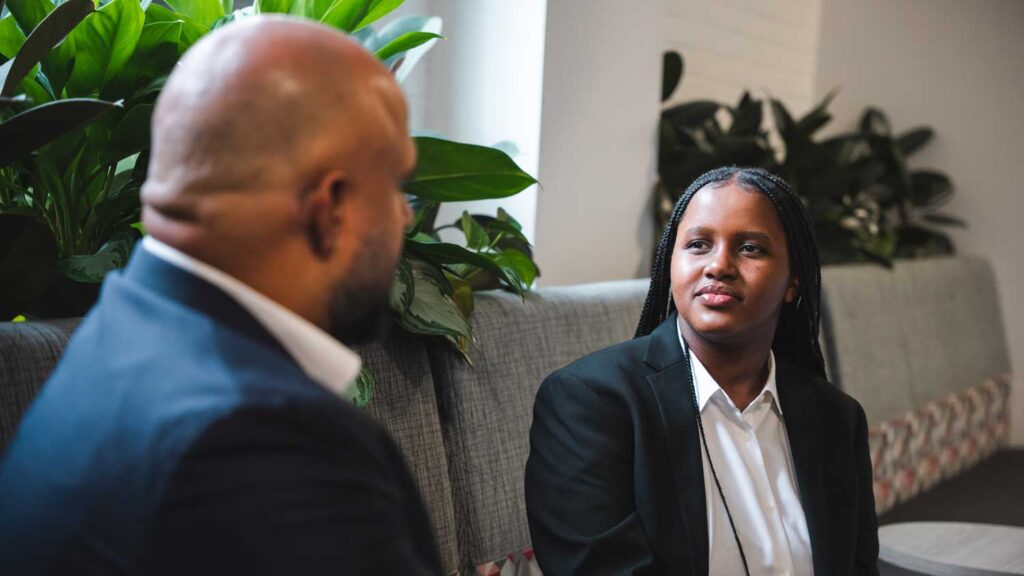

“There’s so much going on in a student’s life. Sometimes that can be overwhelming,” Cline says. “The structure gives them the ability to focus on what they’re doing in the mentorship program each month. They continue to build on that experience with their mentor, so it will lead to an end result of their choosing.”
As with students, mentors also apply to the program. Chosen mentors then have an orientation with Cline and other Poole staff members and receive support as needed throughout the program. Mentees and mentors are carefully paired based on a similar career interest or a specific role, such as a CEO, to which a student aspires.
Poole staffers monitor progress between mentors and mentees with a questionnaire and evaluations during the program, which kicks off and ends with a luncheon for all participants.
Scenes From Our First Mentorship Luncheon
Mentee-mentor meetings can be virtual or in person. Vats conducted most meetings remotely, both one on one and in group sessions. “I made myself available,” he says. Mentees had his personal email address and cell phone number.
Vats, managing director at ICR Capital and a member of Poole’s advisory board, talked with his mentees about the differences in finance-related positions. “The students I mentored walked away better informed about how to prepare to enter the job market,” he says.
Not all mentors in the program are Poole graduates. But many alumni want to help graduates who come after them.
“Poole has an excellent alumni base. It’s important, given our varied experiences, to give back to the university and help students maximize their potential by learning more about the job market,” Vats says. “It’s important to a lot of people who are NC State alumni to see other NC State alumni succeed.”
Vats’ mentoring may help Mbugua succeed as she starts her career. The mentorship program has been one highlight of her time at Poole. “Being able to create a mentorship with an actual Poole alum was very impactful, as well as meeting other students within Poole I hadn’t met before,” she notes.
Building a Lasting Relationship
Structured mentoring doesn’t help just undergraduates. It also gives graduate students an advantage as they prepare for their career.
Poole’s Jenkins Master of Accounting program has a mentoring component in which each student has an assigned faculty member who connects with them at least monthly.
“It’s more than just being there. It’s making sure the connection takes place,” MAC program director Scott Showalter says.
“It’s more than just being there. It’s making sure the connection takes place.”
–Scott Showalter
Some of the connections are creative. One MAC professor hosts mentees at his house for dinner. Last December, Showalter mailed his mentees hot chocolate and a cup, and around Christmas they met on Zoom to share the treat and socialize. “We try to think of things to do that keep them part of the family,” he says.
MAC professor Nathan Goldman has about 20 mentees with whom he meets as a group numerous times during the year. They discuss adapting to a master’s program, teamwork, preparing for the CPA exam and other topics. With interested students, he talks about the prospects of a doctoral accounting program.
The meetings are usually over a meal and outside Nelson Hall “to truly disentangle this mentoring from coursework,” says Goldman, who also has an open-door policy at his office with mentees.
In addition to providing ways to mingle socially with other MAC students, a real-world connection between mentors and mentees gives students a foundation.
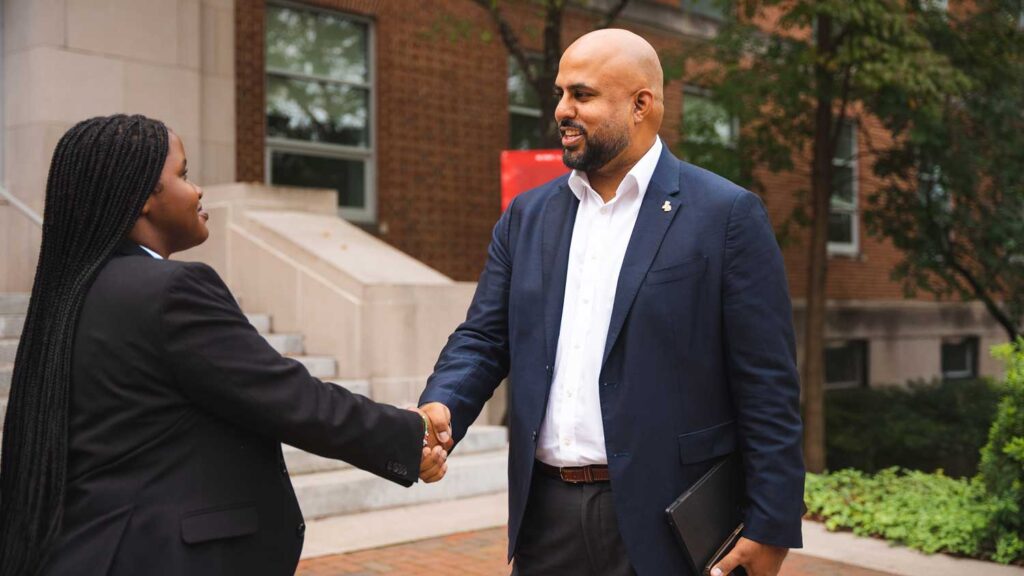
“Relationship building is very important in students’ careers as they start their jobs. The mentoring program provides them an opportunity to develop a relationship with somebody besides just their peers,” Goldman says.
One of his mentees, 2024 graduate Alexandra Nickolas, plans to maintain her NC State network, including Goldman and other MAC faculty.
“I liked having a professor accessible to only a select few students. Instead of trying to talk with professors who are dealing with all the MAC students, you have a professor who’s more focused on you and about 20 other students,” she says.
Spending time getting to know other mentees with Goldman off campus was valuable for Nickolas, too, as was listening to talks by recent alumni Goldman brought to campus.
Nickolas, who starts a position with PricewaterhouseCoopers in Chicago this fall, got guidance from Goldman when she was studying for the CPA exam. “I know if I ever have a question, I can reach out to my professors,” she says.
After MAC and undergraduate mentees graduate, maintaining connections with professors and professionals in the field they met as mentees could lead possibly to career advancement opportunities.
One aim of the undergraduate mentoring program is to expand a hiring pipeline between Poole and a range of businesses by drawing executives to serve as mentors. “The more we can get corporate executives to interact with students, the more they will recruit from Poole,” Anand says.
“The mentorship program isn’t just about personal growth. It’s about building a lasting, supportive community that uplifts everyone involved.”
–Yvonne Mbugua
But the program is about more than coaching students in how to find meaningful employment. “It’s about really building a lasting relationship. They can continue the relationship during their career and rely on their mentor’s support,” Cline says.
That’s what Mbugua plans to do. “The goal I have in mind is to keep in contact and keep things consistent. I think it’s good to maintain those connections,” she says. “The mentorship program isn’t just about personal growth. It’s about building a lasting, supportive community that uplifts everyone involved.”
More from Poole Business: Fall 2024
See all in current issue- Categories:




